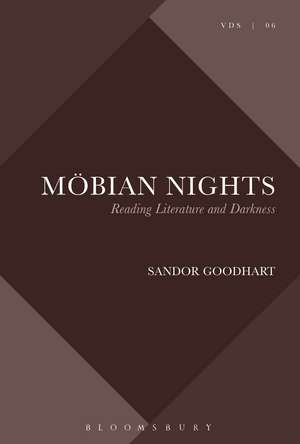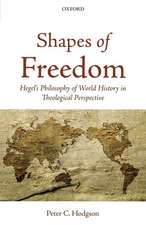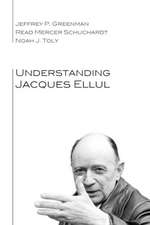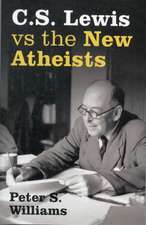Möbian Nights: Reading Literature and Darkness: Violence, Desire, and the Sacred
Autor Professor Sandor Goodharten Limba Engleză Paperback – 20 feb 2019
| Toate formatele și edițiile | Preț | Express |
|---|---|---|
| Paperback (1) | 252.93 lei 6-8 săpt. | |
| Bloomsbury Publishing – 20 feb 2019 | 252.93 lei 6-8 săpt. | |
| Hardback (1) | 776.24 lei 6-8 săpt. | |
| Bloomsbury Publishing – 23 aug 2017 | 776.24 lei 6-8 săpt. |
Preț: 252.93 lei
Preț vechi: 323.76 lei
-22% Nou
Puncte Express: 379
Preț estimativ în valută:
48.40€ • 50.54$ • 39.97£
48.40€ • 50.54$ • 39.97£
Carte tipărită la comandă
Livrare economică 15-29 aprilie
Preluare comenzi: 021 569.72.76
Specificații
ISBN-13: 9781501350818
ISBN-10: 1501350811
Pagini: 352
Dimensiuni: 152 x 229 mm
Greutate: 0.46 kg
Editura: Bloomsbury Publishing
Colecția Bloomsbury Academic
Seria Violence, Desire, and the Sacred
Locul publicării:New York, United States
ISBN-10: 1501350811
Pagini: 352
Dimensiuni: 152 x 229 mm
Greutate: 0.46 kg
Editura: Bloomsbury Publishing
Colecția Bloomsbury Academic
Seria Violence, Desire, and the Sacred
Locul publicării:New York, United States
Notă biografică
Sandor Goodhart is Professor of English and Jewish Studies at Purdue University, USA. He is the author of editor of five books, including The Prophetic Law. Essays in Judaism, Girardianism, Literary Studies, and the Ethical (2014), Sacrifice, Scripture, and Substitution: Readings in Ancient Judaism and Christianity (co-edited with Ann Astell, 2011) and For René Girard. Essays in Friendship and Truth (co-edited with Jørgen Jørgenson, Tom Ryba, and James G. Williams, 2009).
Cuprins
Preface and AcknowledgmentsIntroduction: Möbian Turns: Difference as Continuity1. After The Tragic Vision: Krieger and Criticism, Lentricchia and Crisis2. Disfiguring de Man: Literature, History, and Collaboration3. Witnessing the Impossible: Laub, Felman, and the Trauma of Testimony4. Documenting Fiction: Kolitz, van Beeck, Levinas, and Holocaust Witness 5. "And Darkness Upon the Face of the Deep": Counter-Redemptive Hermeneutics in Wiesel, Mauriac, Cayrol, Blanchot, Levinas, and Genesis 16. Criticism, Literature, and the Möbian7. Literarary Reading, the Möbian, and the PosthumousConclusion: Versions of Night: Reading Literature and DarknessBibliographyIndex
Recenzii
In this beautifully written and strikingly original contribution to post-Holocaust literature, Sandor Goodhart locates in the Möbian structure first described by 19th-century mathematician August Ferdinand Möbius a model for difference or otherness that, in fact, attests to continuity and sameness. Tracing in Möbian fashion an autobiographical line extending from Homer to Beckett, Goodhart shows that we never stand outside the drama the literary presents to us. Suggesting that Möbian logic is endemic to all literary critical discourse, Goodhart, at once an astute philosopher and consummate Jewish storyteller, attests to the 'doubling back of language on itself' in a dark night that makes all writing 'the story of my death.'
Möbian Nights presents a sensitive and novel reading of the Möbian as a theoretical and structural frame of interpreting literature. Here the Möbian, not unlike chiastic structures of language and thought, speaks to the interconnected relationship between past and present, difference and continuity, self and other, silence and bearing witness. Through a variety of challenging perspectives, this deeply engaging book gets at the heart of what it means to tell a story. Set against a post-Holocaust landscape and the legacy of night, Goodhart reflects upon a cautionary and discerning way of approaching the world in which we live.
In this extraordinarily rich and thought-provoking follow-up to his earlier Sacrificing Commentary, Sandor Goodhart offers us a new, 'Möbian' basis for a general theory of the literary, which encompasses an impressively wide range of texts and authors, from Homeric epic to Derridean deconstruction. The intellectual tour de force does not for a moment, however, lose sight of the real historical crisis of our time; for over it all hovers the shadow of Auschwitz. Möbian Nights will prove necessary reading for anyone seriously interested in literature and literary criticism, and their relation to each other, as well as to philosophy, Biblical religion, and ethics.
Möbian Nights presents a sensitive and novel reading of the Möbian as a theoretical and structural frame of interpreting literature. Here the Möbian, not unlike chiastic structures of language and thought, speaks to the interconnected relationship between past and present, difference and continuity, self and other, silence and bearing witness. Through a variety of challenging perspectives, this deeply engaging book gets at the heart of what it means to tell a story. Set against a post-Holocaust landscape and the legacy of night, Goodhart reflects upon a cautionary and discerning way of approaching the world in which we live.
In this extraordinarily rich and thought-provoking follow-up to his earlier Sacrificing Commentary, Sandor Goodhart offers us a new, 'Möbian' basis for a general theory of the literary, which encompasses an impressively wide range of texts and authors, from Homeric epic to Derridean deconstruction. The intellectual tour de force does not for a moment, however, lose sight of the real historical crisis of our time; for over it all hovers the shadow of Auschwitz. Möbian Nights will prove necessary reading for anyone seriously interested in literature and literary criticism, and their relation to each other, as well as to philosophy, Biblical religion, and ethics.


























